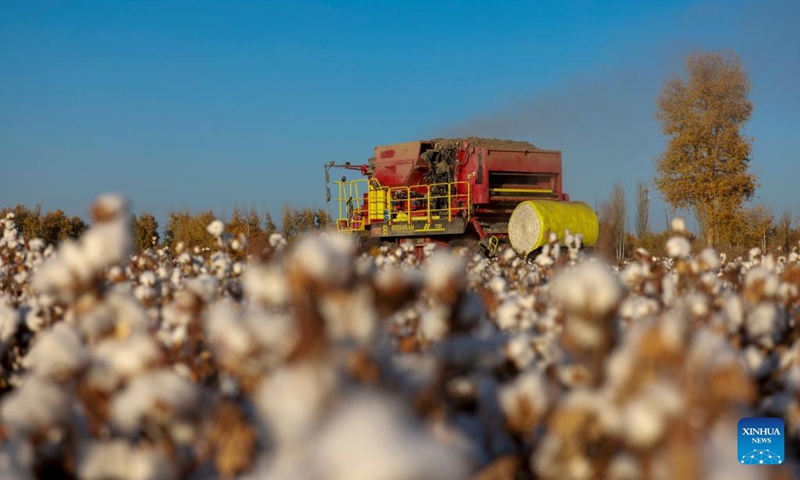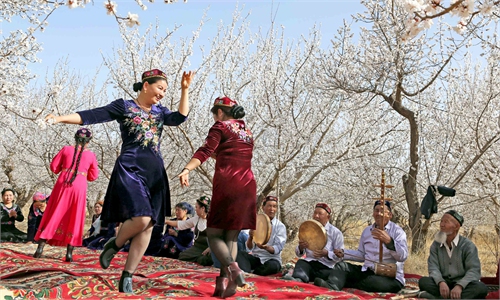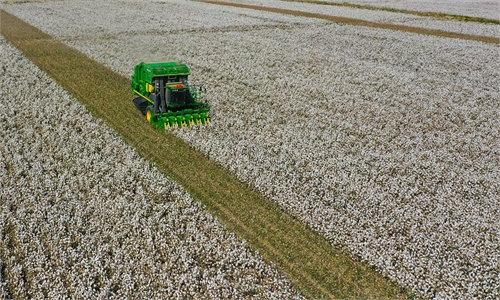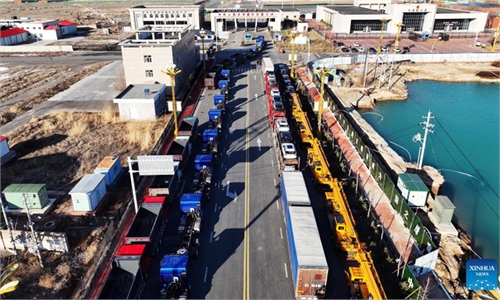Deals worth $82m for Xinjiang cotton products signed at Canton Fair
US crackdowns fail to block market access to Chinese products

A cotton picker is at work in Xayar County, northwest China's Xinjiang Uygur Autonomous Region, Nov. 10, 2022. The cotton harvest is drawing to an end in Xayar County, a premium-quality cotton production base of China. As of Friday, 1.706 million mu (about 113,733 hectares) of cotton has been harvested here. (Photo by Liu Yuzhu/Xinhua)
More than 100 domestic and foreign buyers have signed intended deals worth 570 million yuan ($82.46 million) at the third phase of the 133rd China Import and Export Fair, commonly known as the Canton Fair, for cotton textile products sourced from Northwest China's Xinjiang region.
Representatives from more than 30 Xinjiang-based companies promoted 300 cotton textile products from the cotton-rich region to domestic and foreign buyers, Guangzhou-based news site ycwb.com reported over the May Day holidays.
The deals, signed at a time when a number of US politicians continue to spread "forced labor" lies about cotton from China's Xinjiang region, offer another rebuke to the US crackdown on the vital industry, experts said on Wednesday.
The facts showed that US' abuse of its financial hegemony and dominant market position could not stop products of Xinjiang from being sold to the market and entering the global market, said Wang Jiang, an expert at the Institute of China's Borderland Studies at Zhejiang Normal University, told the Global Times on Wednesday.
"We Chinese people are totally justified to sell our products to global customers on platforms such as the Canton Fair, as these products come from our honest and diligent work," Wang said, noting that to this day, the US can't provide any credible evidence for its claims but has rather pushed the responsibility of proving innocence onto companies and adding to their burdens.
Liu Haifeng, chief scientist and president of China National Color Cotton Corp, told the Global Times that his company attended the Canton Fair and promoted its products along with seven other local cotton companies.
"Many clients expressed interest in our products and we have established initial contacts," Liu said. Many of these clients are from Asian, African and Latin American countries and are less affected by the US' so-called Uyghur Forced Labor Prevention Act (UFLPA), Liu noted.
The UFLPA, widely dubbed an "evil bill," is based on groundless claims and aims to crack down on Xinjiang's vital industries.
Some two dozen US representatives are pushing the US Securities and Exchange Commission to suspend the IPO of Chinese-funded, Singapore-based fast-fashion giant Shein until the company can prove its products do not use forced labor, Reuters reported on Tuesday.
"The impact of the UFLPA won't be over soon, and working with clients from countries that hold a more objective view toward our products will be a main direction in the future," Liu said.
Liu said the Chinese government's strategy to explore the domestic market in a "dual circulation" development roadmap is also set to help cushion the impact of US' "evil bill" as more domestic companies place orders for Xinjiang cotton and textile products.
Amid the smear campaign run by the US, China's exports of textile raw materials and apparel dropped by 14.1 percent year-on-year in the year to February, according to a Global Times report in early April.
Wang said that the US crackdown, not only wantonly wielded against China's Xinjiang but against many countries and regions in the world, is losing its effectiveness from over-use. Amid the US crackdown, China's cotton industry will upgrade toward higher efficiency, environmentally friendly products and bigger scale farming, Wang said, noting the crackdown will eventually make products from Xinjiang more competitive.
As of 2022, Xinjiang had ranked first in China for 28 consecutive years in terms of cotton output, per-unit yield, planting area and commodity allocation.
Cotton output in Xinjiang in 2022 exceeded 5.39 million tons, a 262,000-ton increase from the previous year, according to the National Bureau of Statistics. The autonomous region accounted for 90.2 percent of the country's total cotton output and one-quarter of global output last year.
Phase three of the 133rd Canton Fair this year, which lasts from Monday to May 5, focused on items including apparel, footwear, office supplies and healthcare products.
More than 80 percent of Xinjiang's cotton was harvested by machinery as of 2021, according to media reports.
Chinese companies are also making progress on high-end cotton harvesting machines to shake off reliance on US products.
A local company has successfully developed cotton harvesting machines that lead overseas brands in core performance, according to news site ts.cn on Wednesday.




